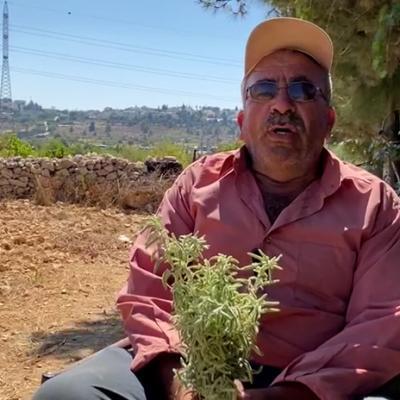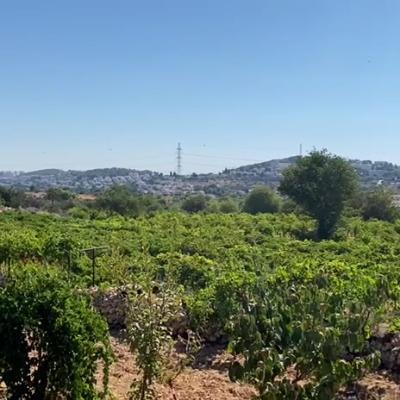(MENAFN- Palestine News Network )
Bethlehem/ PNN/
In the Palestinian town of Al-Khader, located west of Bethlehem, farmer Khaled Muhammad Yaqub continues to stand his ground on his ancestral land, despite ongoing assaults from Israeli settlers and Occupation forces.
Khaled Yaqub inherited this land from his forefathers and works daily in his vineyards, cultivating grapes, even as settlers repeatedly attempt to seize his land and other areas of the village. Al-Khader lies in the heart of the Gush Etzion settlement bloc, an area under constant threat of land grabs and settlement expansion.
Khaled Yaqub's land is part of a fertile strip of fields in Al-Khader, where many Palestinian families depend on agriculture as their primary source of livelihood. However, these lands face relentless threats due to the expansion of illegal Israeli settlements.
Yaqub recounts the risks and challenges he faces from settlers, saying: "For us, the land is dignity and survival. I will not abandon it, no matter the circumstances."
Recently, since the start of the war, Khaled told PNN that he has faced increasing pressure and threats. Israeli settlers and soldiers have blocked the road to his land, forcing him to walk at least 300 meters each day from where he parks his car to his fields. At times, he must make several trips back and forth, carrying up to 40 kilograms of grapes from his land, adding to the burdens he faces as an aging man and farmer.
Khaled adds that he fears bringing his sons and daughters to the land due to the surveillance and practices of the Israeli occupation, as his land lies within the Gush Etzion settlement bloc, where hundreds of cameras are installed. When Israeli soldiers and settlers spot his children on the land, they arrive and harass them. Because of this, Khaled prefers they stay away from the land at this time.
One of the tactics used against Khaled Yaqub by the occupation is the uprooting of trees. In recent times, the threats have intensified, and settlers have destroyed parts of his crops, damaging his grapevines, which are his primary source of income. Despite these challenges, Khaled insists on staying on his land and farming it. He says, "I will continue to farm this land because it is our life and a part of our Palestinian identity. They want to scare us, but we are stronger."
In recent years, Israeli forces have released deer and wild boars under the guise of protecting nature, but the real intent, Khaled says, is to ruin crops and force Palestinians off their land. He and other farmers in the area have built wire fences to protect their fields from these wild animals.
Khaled's resilience is a symbol of the ongoing Palestinian struggle against land confiscation and settlement expansion. Despite the restrictions imposed by the occupation forces, which at times prevent him from accessing parts of his land, he finds ways to continue his daily work, driven by an unbreakable will to preserve his agricultural heritage.
Like many other Palestinian villages, Al-Khader faces constant threats from the separation wall and the surrounding settlements. Yet, farmers continue their daily struggle to protect their land and contribute to supporting the Palestinian economy.

International reports have stated that Israeli settlements pose a direct and severe threat to Palestinian agricultural lands, significantly affecting the livelihoods of thousands of Palestinian families who rely on agriculture as their main source of income. Since the occupation of the West Bank in 1967, Israel has built numerous illegal settlements on Palestinian land under international law, leading to the confiscation of vast areas of fertile farmland.
The reports highlight that one of the most prominent dangers posed by settlements is the destruction of agricultural lands and the restriction of Palestinian farmers' access to their fields. Farmers are often prevented from reaching their lands due to movement restrictions, military checkpoints, the separation wall, and closed military zones designated for settlements. Moreover, farmers suffer from repeated settler attacks, including the destruction of crops, the uprooting of olive trees, and the pollution of water sources.
In addition to these direct threats, settlement expansion reduces the available agricultural land as fertile areas are transformed into Israeli settlements or industrial zones for settlers. This, in turn, undermines the sustainability of the Palestinian agricultural sector, reducing the available farmland and destroying crops, leading to a decline in agricultural production and an increased reliance on imports.

Settlement activities also result in the destruction of the natural environment in Palestinian territories, where soil erosion and tree cutting harm biodiversity and negatively impact the agricultural ecosystems that depend on these lands. All of these factors threaten Palestinian food security, worsen the economic crisis facing the agricultural sector, and exacerbate the deteriorating conditions of farmers.
This story was produced as part of the Qarib program, implemented by the French Agency for Media Development (CFI), in partnership with and funded by the French Development Agency (AFD).
MENAFN29092024000205011050ID1108727275
Legal Disclaimer:
MENAFN provides the information “as is” without warranty of any kind. We do not accept any responsibility or liability for the accuracy, content, images, videos, licenses, completeness, legality, or reliability of the information contained in this article. If you have any complaints or copyright issues related to this article, kindly contact the provider above.